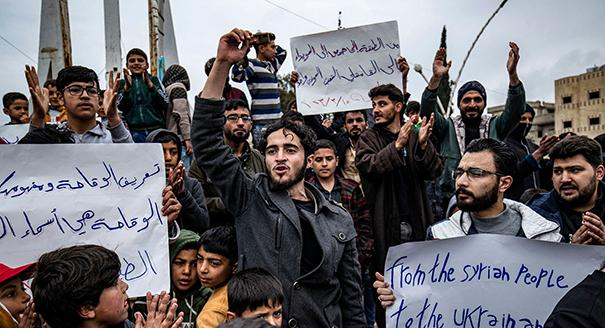
The regional interests behind Syria’s return to the Arab League have nothing to do with democracy, participation, or respect for human rights.
Syria has a rich history stretching back to the earliest civilizations, with a legacy found not only in the traces left by empires, but also in the country’s accumulated cultural heritage. Syrians continue to produce literature, art, poetry, and philosophy at the highest level.
The Syrian people deserve to live in safety in a state that respects their rights, allows them to participate in decisionmaking, provides them with security, stability, and prosperity, and in which their sacrifices—the death of more than half a million Syrians since 2011—have some meaning. Nobody can ever compensate Syrians for the killing, displacement, and destitution they have suffered over the past decade.
Politically speaking, these concerns have not been treated with the gravity they deserve. Syria’s return to the Arab League has little relation to democracy, participatory government, or the rule of law. Nor does it address the Syrian regime’s role, albeit hotly debated, in the exile, displacement, or killing of more than half of the Syrian population.
Regional powers have other interests in allowing Syria’s return to the Arab League. These include the eventual return of Syrian refugees to their country, curbing narcotics trafficking into neighboring countries, particularly of Captagon, a fear that Islamic extremists could take over power in Syria were the regime to fall, and a desire to limit the influence of Iran-backed armed groups, especially in Syria’s south.
Driven by these concerns, Arab states have been moving step by step to mend their ties with Syria. Each positive step by Damascus in one of these areas has been reciprocated—at least by certain Arab governments that have paid more or less zero attention to whether all components of the Syrian people have a voice in the future of their country (even if Arab countries had made such a demand in the past). Yet these regional interests have hit up against multiple obstacles. The Syrian regime’s actions over the past few decades clearly reflect an unwillingness to engage in flexibility or reciprocity.
United Nations resolutions, and particularly the 1951 Refugee Convention and its Protocol, outlaw the forced return of refugees. Resolving this issue would therefore require Syrian cooperation and a desire on the part of the refugees themselves to return home. But the Assad regime’s willingness to facilitate this is doubtful. Damascus does not want to see the return of millions of people who, according to every opinion poll on the subject, largely oppose the regime. Mass returns would also highlight the scale of destruction and the severe lack of basic services the country now faces, likely causing returnees to detest the regime even more. So, attempts by Syria’s neighbors to persuade Damascus to accept a large number of returnees would hit up against major political and economic obstacles.
Nor is the international community particularly keen on supporting reconstruction efforts in Syria at present, despite the incentive they would provide for refugees to return home. This applies not only to the United States, the European Union, the World Bank, the International Monetary Fund, and Western states in general, but also Russia, which has few resources to spare as it continues to focus all its energies on its war in Ukraine. Saudi Arabia is busy developing its own economy and Iran already has given all it can afford to the Syrian regime, despite facing strangulating international sanctions. China has resources, but has little desire to pump them into a politically unstable Syria.
Drug trafficking, particularly of Captagon, has brought Syria huge sums of money, amounting to billions of dollars by some estimates. Therefore, Syria’s willingness to engage seriously with demands from neighboring countries to tackle the trade is dubious at best. Jordan has been forced to carry out several military operations inside Syria to target traffickers, as the Syrian state, to put it mildly, has shown little real will to do so.
Many other questions persist. Will Syria prevent Iranian-backed armed groups from operating from its territory, particularly in the south near the Jordanian border? Can the regime impose its conditions on Tehran, when it has depended so heavily on Iranian military support for its survival? Will its neighbors’ policy of rapprochement push the regime to reach out to the unarmed political opposition or to groups that are not religious extremists? After ten years of United Nations efforts to reach a political solution that brings together all components of Syrian society—efforts that have failed because the regime refuses to involve the opposition in any serious way in government—is there any hope for a breakthrough?
All these questions lack definite answers, but they reveal the complexity of regional efforts to resolve the Syrian crisis. There is no doubt that Syria’s return to the Arab League is a direct consequence of the Arab governments’ desire to win over the regime in order to rein in Iran and religious extremists. For Arab capitals, these concerns trump any of the other questions mentioned earlier. Accordingly, Syria’s reintegration has little to do with any “flexibility” shown by the regime in its dealings with its own population.
It is not yet clear whether Arab governments will go as far as to violate international or U.S. sanctions imposed on Syria, or whether Syria’s return to the Arab League will last. But its return could spark hope for an end to the suffering of the Syrian people and put an end to talk of meaningless “victories” that have brought no real triumph to this people.
